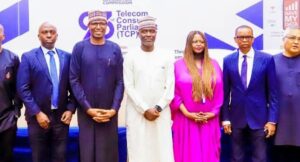

By Correspondent

L-R: Head, Customer Operations, North, MTN, Chikaodi Ofoegbe; Chief Executive Officer, 9Mobile, Obafemi Banigbe; Chairman, Association of Licensed Telecom Operators of Nigeria, Gbenga Adebayo; Executive Vice Chairman/Chief Executive Officer, Nigerian Communications Commission (NCC), Dr. Aminu Maida; Executive Commissioner, Stakeholder Management, NCC, Rimini Makama; Director, Consumer Affairs Bureau, Dr. Ikechukwu Adinde and Chief Executive Officer, Airtel Nigeria, Carl Cruz during the 93rdedition of the Telecom Consumer Parliament hosted by the Commission in Abuja on Thursday, November 7, 2024.
The Nigerian Communications Commission (NCC) has reaffirmed its commitment to transparency and accountability in the telecom sector.
The Executive Vice Chairman of the Commission, Dr. Aminu Maida, made this statement in his keynote address at the 93rd edition of the Telecom Consumer Parliament (TCP) hosted in Abuja on Thursday.
The event, with the theme “Optimizing Data Experience: Empowering Consumers through Awareness and Transparency in a Consumer-Centric Telecom Industry,” aimed to stress the importance of consumer empowerment in the telecom space.
Dr. Maida announced that the Commission is finalizing its Major Incident Reporting Guidelines, which will require telecom operators to notify consumers of major incidents affecting their networks. These reports will be made available on the NCC’s website for public access.
He also revealed that consumers will soon have access to coverage maps that detail the strength of operators’ networks across Nigeria. These maps will highlight areas with coverage gaps, service quality issues, and signal strength, enabling consumers to make more informed choices when selecting a telecom provider.
Emphasizing the need for a consumer-centric telecom industry, Dr. Maida stressed that consumers should feel valued, informed, empowered, and satisfied with the services they receive. He encouraged participants to use the forum to explore ways to optimize the data experience for consumers.
The NCC Executive Vice Chairman reminded attendees that the event serves as a platform for open dialogue, allowing consumers to voice their concerns and ensuring that their needs are addressed.
Dr. Maida expressed confidence that, with sustained efforts, Nigeria can build an ecosystem where all citizens benefit from world-class telecommunications services.
Looking back at the evolution of the telecom industry in Nigeria, he acknowledged that the theme of this year’s event is timely, as internet use has become integral to daily life. He highlighted that the NCC’s role is not only to ensure accessibility but also to improve service delivery for consumers.
Dr. Maida pointed out that over the past two decades, Nigeria’s telecom landscape has evolved from basic voice services to high-speed data that connects, informs, and drives innovation. He noted that the rollout of 3G, 4G, and now 5G networks has facilitated the adoption of social media, e-commerce, online banking, and more by Nigerians.
“The introduction of 3G in the mid-2000s marked the beginning of this transformation, enabling basic browsing and email. The shift to 4G LTE brought faster speeds for video streaming, online gaming, and a variety of digital activities. Today, 5G is opening new frontiers for innovations like smart cities, autonomous vehicles, and the Internet of Things, all driving further demand for data,” he explained.
He also acknowledged the growing concerns of consumers regarding data depletion and billing transparency as data consumption continues to increase.
To address these challenges, the NCC, in collaboration with major telecom operators, launched a Joint Industry Campaign to raise consumer awareness on smarter data usage. The media campaign, which includes radio, television, print, and SMS, aims to educate consumers on how to manage their data usage effectively.
Dr. Maida pointed out that many consumers may have encountered promotional jingles or graphics offering tips on managing data, but the NCC’s message focuses on empowering consumers with the knowledge to optimize their data usage.
He also reminded consumers that advancements in technology can lead to higher data consumption. For example, smartphones with higher screen resolutions require more data for media consumption.
“Many smartphone users may not be aware that their devices can track data usage and set limits on how much data they want to use,” Dr. Maida explained.
“As we continue our discussions at this Parliament on ways to optimize the data experience for telecom consumers, let us remember that our ultimate goal is to create a truly consumer-centric telecom industry where consumers feel valued, informed, empowered, and satisfied with the services they receive,” he said.

